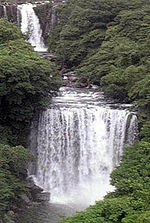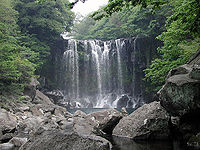- Cheonjeyeon Waterfall
-
Cheonjeyeon Waterfall 
The first two tiers of Cheonjeyeon WaterfallKorean name Hangul 천제연폭포 Hanja 天帝淵瀑布 Revised Romanization Cheonjeyeon Waterfall McCune–Reischauer Ch'ŏnjeyŏn Waterfall Cheonjeyeon Waterfall, not to be confused with the Cheonjiyeon Waterfall, is a three-tier waterfall located on Jeju Island.[1] Cold water flows out of the ceiling of a cave to make the waterfall.[1] Between the precipice of the waterfall and the lower clay layer, water springs out.[2] In first cascade, the cliff is 22 m (72 ft) high and the water falls into Cheonjeyeon pond which is 21 m (69 ft) deep.[2] From there, the water goes to the second waterfall and falls 30 m (98 ft) and continues to the third waterfall.[1][2] Eventually, the water reaches the ocean.[1] Cheonjeyeon means Pond of the Emperor of Heaven.[1][3] According to Korean legend, seven nymphs would descend from the heavens at night and bathe in the waterfall's pond.[3] The falls are a popular tourist attraction on Jeju-do.[4]
The warm temperate forest around Cheonjeyeon Waterfall was designated Natural Monument No. 378 in 1993 because of the rare plants it contains and its value for scientific research.[5] Rare plants such as the solipnan (솔잎난) plants or skeleton fork fern (Psilotum nudum) can be found around the falls in the crevices of rocks.[1][5]
Since ancient times, it is thought that standing under the waterfall on the 15th day of the seventh lunar month can cure diseases by the eighth lunar month, though swimming is now prohibited.[3] On the May of even-numbered years, the Chilseonyeo (Seven Nymphs) Festival is held at this location.[1][3] The waterfall is one of the three famous waterfalls of Jeju, the other two being Cheonjiyeon Waterfall and Jeongbang Waterfall.[6]
Above the falls is Seonimgyo Bridge, which symbolizes the legend of Cheonjeyeon.[1][2]
See also
References
- ^ a b c d e f g h "Official Site of Korea Tourism Org.: Cheonjeyeon Falls". http://www.visitkorea.or.kr/ena/SI/SI_EN_3_1_1_1.jsp?cid=312804. Retrieved 7 June 2011.
- ^ a b c d "Cheonjeyeon Waterfall". http://www.jejucvb.or.kr/ICCViewer/eng/visitors/travel_tour_view.jsp?idno=39&comnum=0-0-0&categoryCode=TOU005&cateCodeName=River/waterfalls/valley. Retrieved 7 June 2011.
- ^ a b c d Cecilia Hae-Jin Lee (24 May 2010). Frommer's South Korea. Frommer's. p. 401. ISBN 9780470591543. http://books.google.com/books?id=sqivXyGIxDAC&pg=PA402. Retrieved 7 June 2011.
- ^ Park, David; Njite (2010). "Relationship between Destination Image and Tourists' Future Behavior: Observations from Jeju Island, Korea". Asia Pacific Journal of Tourism Research 15 (1): 1–20. doi:10.1080/10941660903510024.
- ^ a b "Natural Monuments and Nature Reserves of Korea". Korea Protected Areas Forum. 2009. http://www.paforum.or.kr/area/area.html?cate_idx=29. Retrieved June 7, 2011.
- ^ Geun, Yang Ho (August 29, 2010). "Midnight at the pond of the Gods". Jeju Weekly. http://www.jejuweekly.com/news/articleView.html?idxno=947. Retrieved 7 June 2011.
External links
Coordinates: 33°15′10″N 126°25′02″E / 33.252818°N 126.417274°E
Categories:- Waterfalls of South Korea
Wikimedia Foundation. 2010.

